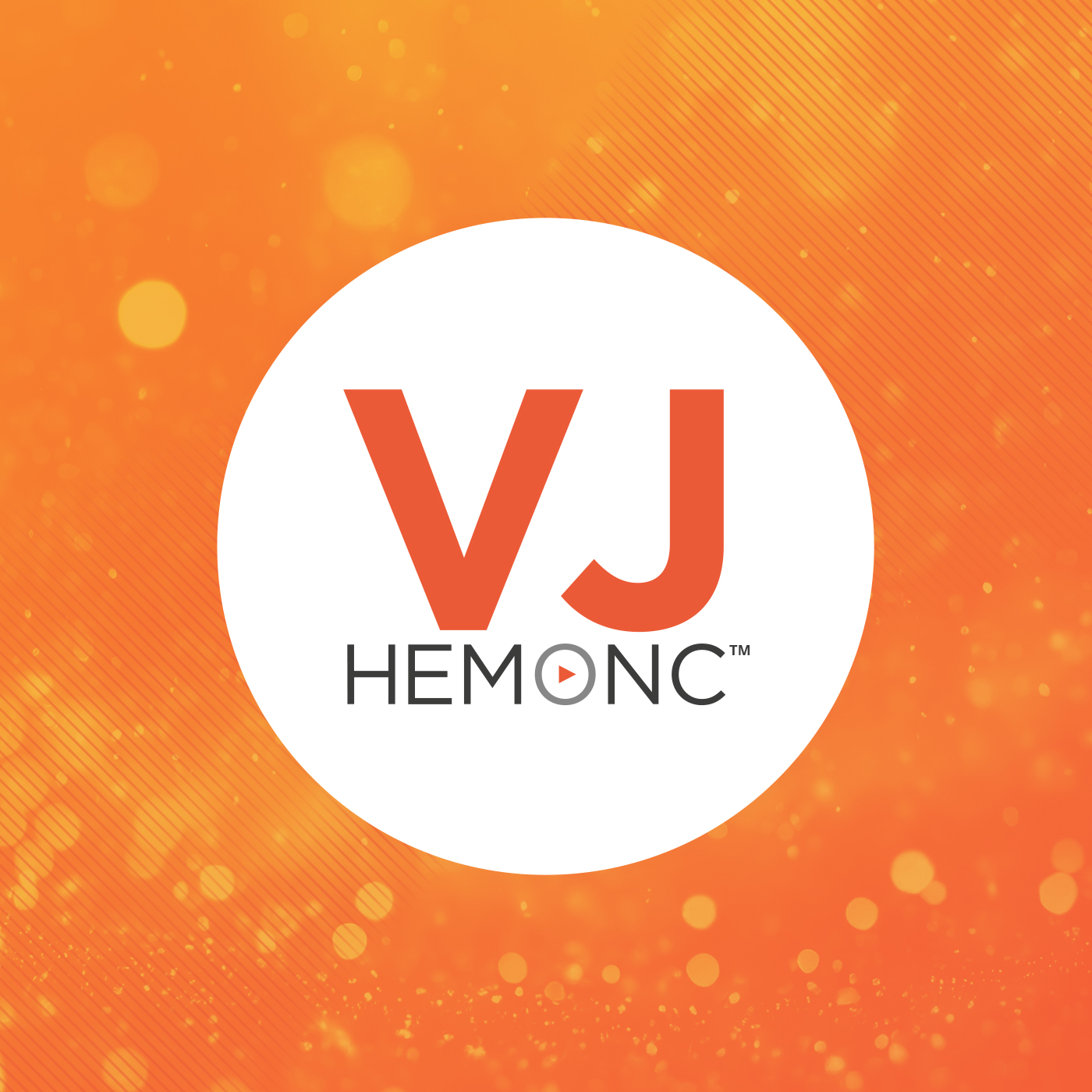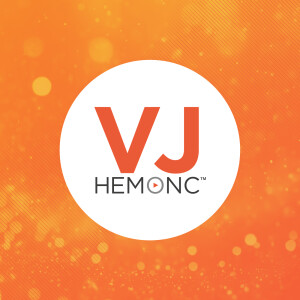
75.5K
Downloads
318
Episodes
The Video Journal of Hematology and Hematological Oncology (VJHemOnc) podcast covers the latest hematological oncology and hematology news from international experts – from leukemias, lymphomas, MDS and MPNs, to sickle cell, aplastic anemia and rare diseases. Made for healthcare professionals and researchers, we are a global, independent, open-access platform. Listen to the latest news, including cutting-edge trial updates, controversies and opinion. If you enjoy the podcast, please leave us a rating and review! For more news visit www.vjhemonc.com
The Video Journal of Hematology and Hematological Oncology (VJHemOnc) podcast covers the latest hematological oncology and hematology news from international experts – from leukemias, lymphomas, MDS and MPNs, to sickle cell, aplastic anemia and rare diseases. Made for healthcare professionals and researchers, we are a global, independent, open-access platform. Listen to the latest news, including cutting-edge trial updates, controversies and opinion. If you enjoy the podcast, please leave us a rating and review! For more news visit www.vjhemonc.com
Episodes

Tuesday Jun 07, 2022
The importance of early intervention and interception in myeloma
Tuesday Jun 07, 2022
Tuesday Jun 07, 2022
Multiple myeloma is a heterogenous and complex disease, with many experts agreeing that screening for precursor conditions can improve patient outcomes. With several new technologies emerging and an increased understanding of precursor conditions, it is evident that early intervention and interception are important steps in finding a cure for this disease.
In this exclusive podcast, Irene Ghobrial, MD, of Dana-Farber Cancer Institute, Boston, MA, discusses the importance of early interception in multiple myeloma and how screening and risk stratification can help with finding a cure.

Friday Jun 03, 2022
Impact of the COVID-19 pandemic on the EBMT & projects in the pipeline
Friday Jun 03, 2022
Friday Jun 03, 2022
The 48th Annual Meeting of the European Society for Blood and Marrow Transplantation (EBMT), which took place on 19-23 March 2022, was held virtually for the third time in a row due to the unprecedented humanitarian crisis in Ukraine. Despite the great success of this year’s Annual Meeting, the EBMT had to face significant challenges during these past two years of COVID-19 pandemic.
Join us for this insightful discussion where leading experts Christian Chabannon, MD, PhD, Paoli-Calmettes Institute, Marseille, France, and President of the EBMT Anna Sureda, MD, PhD, Catalan Institute of Oncology, Duran I Reynals Hospital, Barcelona, Spain, review the efforts of the EBMT during the COVID-19 pandemic, and comment on the impact of the pandemic on transplantation practices. Prof. Chabannon and Dr Sureda also discuss the relevance of stem cell transplantation within the context of CAR-T therapy and outline the EBMT’s future projects.

Friday May 27, 2022
CAR-T and lymphoma treatment in the UK
Friday May 27, 2022
Friday May 27, 2022
Lymphoma treatment has seen many recent advances, with CAR-T therapy being a game changer for patients. Several clinical trials investigating the safety and efficacy of CAR-T products are ongoing, and many experts in the field are eager to see how the availability of CAR-T products will influence the treatment landscape. Of course, access to novel therapies varies in different regions, and while there are many approvals going through NICE, there are still questions that remain regarding lymphoma treatment in the UK.
In this exclusive podcast, Robin Sanderson, BSc, MBChB, MRCP, FRCPath, PhD, of King's College Hospital NHS Foundation Trust, London, UK, and Tobias Menne, MD, PhD, FRCPath, of the Newcastle upon Tyne NHS Foundation Trust, Newcastle, UK, discuss lymphoma treatment in the UK, drawing focus on CAR-T therapy, including the management toxicities, treating transplant-ineligible patients, and more.

Friday May 20, 2022
Harnessing the power of immunotherapy in myeloma and amyloidosis
Friday May 20, 2022
Friday May 20, 2022
The myeloma treatment landscape has seen a lot of progress in the last few years, with several novel therapies emerging, including immunomodulatory imide drugs (IMiDs), monoclonal and bispecific antibodies, and more recently, cereblon E3 ligase modulators (CELMoDs). Targeting resistance to those drugs is an ongoing topic of research, and it is important to learn how to best use these agents to enhance the patient’s immune response and eventually approach a cure. In amyloidosis as well, there is a growing interest in exploring immunotherapeutic strategies such as CAR-T therapy and bispecific antibodies to improve patient outcomes.
In this fascinating episode chaired by Faith Davies, MBBCh, MRCP, MD, FRCPath, of NYU Langone Medical Center, New York, NY, Charlotte Pawlyn, BA, MBBChir, MRCP, PhD, FRCPath, of The Institute of Cancer Research and The Royal Marsden NHS Foundation Trust, London, UK, and Hearn Jay Cho, MD, PhD, of Mount Sinai Hospital, New York, NY, have a discussion about novel targets in 2022, commenting on IMiD resistance, immunogenic cell death, and novel treatments for amyloidosis. This discussion took place at The International Workshop on Myeloma 2022, held in Scottsdale, AZ.

Friday May 13, 2022
The impact of AI and machine learning algorithms in MDS
Friday May 13, 2022
Friday May 13, 2022
Artificial intelligence (AI) and machine learning algorithms are transforming treatment and prognosis in hematological malignancies, as well as other areas of medicine. AI is becoming increasingly important for managing large data sets and patient information and is being explored in a number of areas. Despite the growing interest and promise of AI and machine learning algorithms in a medical setting, there are many challenges associated with applying these in a clinical setting, and questions that still need to be answered.
In this exclusive podcast, Amer Zeidan, MBBS, MHS, of Yale University and Yale Cancer Center, New Haven, CT, Aziz Nazha, MD, of the Thomas Jefferson University, Philadelphia, PA, and Anne Sophie Kubasch, MD, of Leipzig University Hospital, Leipzig, Germany, hold a fascinating discussion on the impact of artificial intelligence and machine learning in myelodysplastic syndromes (MDS).

Friday May 06, 2022
MMRF-CoMMpass: the genomic basis of myeloma subtypes
Friday May 06, 2022
Friday May 06, 2022
Despite significant advances in molecular profiling and treatments for multiple myeloma, patients with high-risk and ultra high-risk disease still have poor outcomes, with variable and unpredictable responses to therapy. The MMRF-CoMMpass study (NCT01454297) is a cooperative research endeavor aiming to map the genomic profile of patients with multiple myeloma to clinical outcomes. Certain features such as loss of P53 and chromosome 1 abnormalities have been associated with high-risk disease. It is important to better characterize multiple myeloma subtypes to advance our understanding of patient responses to therapy and how high-risk features may impact long-term outcomes.
In this exclusive podcast, Jonathan Keats, PhD, Translational Genomics Research Institute, Phoenix, AZ, discusses some of the results from the CoMMpass study, highlighting specific genomic features linked to high-risk and ultra high-risk multiple myeloma. This discussion took place at The International Workshop on Myeloma 2022, held in Scottsdale, AZ.

Friday Apr 29, 2022
Genomics in the age of immuno-oncology
Friday Apr 29, 2022
Friday Apr 29, 2022
Immunotherapies are at the forefront of myeloma treatment and there are many questions remaining. Defining high-risk is important when making treatment decisions in myeloma and including genomic data may allow for a more personalized risk strategy to be formed for each patient. Highly proliferative cells remain an important indicator of disease, and another factor to consider is the susceptibility of dormant cells to apoptosis, which can influence patient relapse. With the emergence of novel immunotherapies, it is still important to consider genomic data when identifying high-risk patients and use this information to better understand prognosis and potential mechanisms of resistance to novel agents.
In this exclusive podcast, Gareth Morgan, MD, PhD, FRCP, FRCPath of NYU Langone, New York City, NY, Francesco Maura, MD, of the Sylvester Comprehensive Cancer Center, Miami, FL, and Leo Rasche, MD, of the University of Würzburg, Würzburg, Germany, have a fascinating discussion in which they explore genomics in 2022, highlighting key topics including the impact of genomics on the success of immunotherapies, changing risk stratification, and the role of dormant cells in disease progression. This discussion took place at The International Workshop on Myeloma 2022, held in Scottsdale, AZ.

Friday Apr 22, 2022
Understanding multiple myeloma at the single-cell level
Friday Apr 22, 2022
Friday Apr 22, 2022
Relapsed/refractory (R/R) multiple myeloma remains an incurable hematological malignancy with an unmet clinical need. It is necessary to gain a deeper understanding of the mechanisms driving disease progression and drug resistance in order to find new therapeutic targets for this patient population. In recent years, single-cell approaches including genomic, transcriptomic, and proteomic technologies have emerged as promising tools to decipher this complex disease.
In this episode chaired by Irene Ghobrial, MD, of Dana-Farber Cancer Institute, Boston, MA, Rodger Tiedemann, PhD, ChB, MB, of Princess Margaret Cancer Centre, Toronto, ON, Yael Cohen, MD, of Tel-Aviv Sourasky Medical Center, Tel Aviv, Israel, and Eileen Boyle, MD, PhD, of NYU Langone, New York City, NY, have a fascinating discussion on using single-cell multiomics to better understand the mechanisms of drug resistance and response to therapy, drawing focus on the impact of chromosome 1q copy number alterations on patient outcomes, as well as on signatures of drug resistance in primary refractory patients, and on how interactions between tumor cells and the tumor microenvironment can predict response to treatment. This discussion took place at The International Workshop on Myeloma 2022, held in Scottsdale, AZ.

Friday Apr 01, 2022
Recent advances in amyloidosis treatment
Friday Apr 01, 2022
Friday Apr 01, 2022
Amyloidosis is a disease that results from the accumulation of a toxic, insoluble protein called amyloid in various tissues and organs, which eventually leads to organ failure. Amyloidosis can be acquired or hereditary, and occurs when protein misfolding turns soluble precursor proteins into insoluble fibrils. There are four main types of amyloidosis: light chain (AL) amyloidosis, AA amyloidosis, ATTR amyloidosis, and AB2M amyloidosis. Amyloidosis remains a challenging disease to diagnose and treat, although recent advances and data from clinical trials provide promising future therapeutic strategies.
In this exclusive podcast, Efstathios Kastritis, MD, University of Athens School of Medicine, Athens, Greece, Vaishali Sanchorawala, MD, Boston University School of Medicine, Boston, MA, and Maria Moscvin, MD, Brigham and Women’s Hospital, Boston, MA, discuss treatment approaches and clinical trial updates to bring you the latest in this field. This interview took place at the 63rd ASH Annual Meeting and Exposition Congress, Atlanta, GA, 2021.

Friday Mar 25, 2022
ASH 2021: a deep dive into ALL immunotherapy
Friday Mar 25, 2022
Friday Mar 25, 2022
Various forms of immunotherapy represent a novel treatment option, especially for patients who progress from conventional chemotherapy hematopoietic stem-cell transplantation (HSCT). Chimeric antigen receptor (CAR) T-cell therapy consists of modified T cells from patients that target antigens specific to cancer cells. Six CAR T-cell therapies have currently been approved by the FDA, with tisagenlecleucel and brexucabtagene autoleucel approved for B-cell acute lymphoblastic leukemia (B-ALL).
Tune into this podcase as Nitin Jain, MD, University of Texas MD Anderson Cancer Center, Houston, TX, delves into the latest updates in CAR T-cell therapies for B-ALL, including exciting results from the Phase I BALLI-01 trial (NCT04150497) of UCART22 and a Phase I/IIa trial of PBCAR0191 (NCT03666000). Dr Jain additionally presents preliminary results from a Phase I/II trial of ADCT-602 (NCT03698552), an antibody drug conjugate composed of an anti-CD22 antibody and a pyrrolobenzodiazepine (PBD) dimer cytotoxin. This interview took place at the 63rd ASH Annual Meeting and Exposition Congress, Atlanta, GA, 2021.
